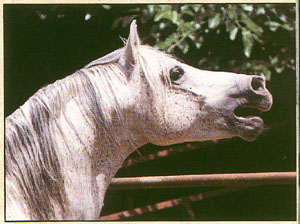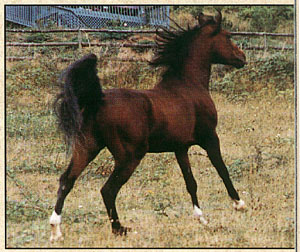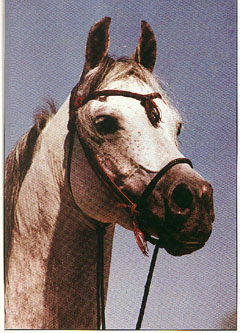By Charles Craver
from the Arabian Horse World, July 93
Now and then someone creates a time capsule so that people of the future can see how things used to be. Some of these time capsules are especially valuable because they pass on in unchanged form the most beautiful and useful things of one time period to another: a symphony of Beethoven for the future, an instance of technology or mathematics which has made a special contribution.
 A time capsule is a way of saying, “We think this is beautiful and we want to be sure you do not forget it,” or “We have perfected this item of life, and we want you to remember what we did.”
A time capsule is a way of saying, “We think this is beautiful and we want to be sure you do not forget it,” or “We have perfected this item of life, and we want you to remember what we did.”
The best time capsules preserve something that is useful: something that makes life better for people in the future.
We have time capsules in Arabian breeding, too. They are the multitude of projects of our preservation breeders. Each of these is something that some serious person is preserving of the best in the history of Arabian breeding: the defining horse of some certain kind, the best way of breeding horses, the best goals for breeding Arabian horses. The idea of preservation breeding is to be sure the present glories of the breed do not lose contact with the wonderful horses and breeders from which they came.
Preservation breeding means setting a boundary around treasured areas of past breeding. Each is kept as a separate entry, as a capsule of Arabian breeding that does not change with time as far as essentials are concerned. These separate, distinct capsules are not isolates in Arabian breeding. They contribute on a continuing basis to the larger Arabian breeding scene as effective elements of current activity. Some Preservation horses attain the highest honors in their own right. It is surprising how many others turn up as parents and grandparents of successful horses. Preservation breeding is not a matter of being a hermit or operating a zoo for antique types of Arabian horses.
 Mainstream Arabian breeding is sometimes portrayed as an affair of the moment. Glory goes to today’s champion, yesterday’s import, and tomorrow’s trend. Preservation breeders live a different life. Each is tuned to some part of the history of Arabian horses that worked especially well. To recognize success, the Preservation breeder does not have to depend on judges or representations by artists or standards that have been prepared for a transient show context. It is so much simpler instead to refer to flesh and blood horses of the past that were proven success or to the breeding plans from which such horses came. Preservation breeders have the further advantage that their breeding stock does not go out of date. It may become old and blemished, but its function in preserving values of past Arabian breeding remains a constant. Judges, champions, and markets come and go, but Preservation breeders and their horses just keep rollin’ along.
Mainstream Arabian breeding is sometimes portrayed as an affair of the moment. Glory goes to today’s champion, yesterday’s import, and tomorrow’s trend. Preservation breeders live a different life. Each is tuned to some part of the history of Arabian horses that worked especially well. To recognize success, the Preservation breeder does not have to depend on judges or representations by artists or standards that have been prepared for a transient show context. It is so much simpler instead to refer to flesh and blood horses of the past that were proven success or to the breeding plans from which such horses came. Preservation breeders have the further advantage that their breeding stock does not go out of date. It may become old and blemished, but its function in preserving values of past Arabian breeding remains a constant. Judges, champions, and markets come and go, but Preservation breeders and their horses just keep rollin’ along.
One of the marvels of Arabian breeding is that almost everyone who seriously tries a breeding program may be successful. That is true for Preservation breeders, too. Thanks to them we have a variety of successful types within the Arabian breed that far exceeds what any person could conceive of as a single standard for the Arabian horse. There is, indeed, a special kind of Arabian horse for each person who wants one. Many such horses are either themselves examples of Preservation breeding or have Preservation horses as close-up ancestors.
Could the breed continue without Preservation breeding? Perhaps it could for a while, but to maintain quality we would have to learn about breeding horses in an entirely new way. We could not count any longer on what we have learned from the most successful breeders of the past, nor could we count on using their bloodlines as building blocks for present pedigrees. After a while we would no doubt find ourselves identifying special groups of horses that liked and could rely on and which would then become preservation groups in the future. Would these new groups be successful in preserving the Arabian breed? The answer would depend on how good a use they made of Preservation groups of the past.
Preservation breeding and Arabian horses go together. We are not willing to forget or discount the beautiful horses of the past which led to the beautiful horses we now have. One of the ways we ensure that new generations of horses remain “Arabians” is by constant reference to the “time capsules” of Preservation horses which are saved for us. We value these horses for what they are and because they need no excuse or explanation. We constantly use the option of sprinkling the pedigrees of other kinds of Arabian horses with carefully guarded time capsules made up of the best that they preserve.
Comments from Two Davenport Farms:
 CRAVER FARMS, Charles and Jeanne Craver, Hillview, Illinois. “While we specialize in horses of entirely Davenport bloodlines, we also have a number of additional bloodlines of other Al Khamsa backgrounds,” says Charles Craver. “The best foal of 1993 is yet to be born, but will here by Christmas. Meanwhile, we have several prior foals which are perfect in every particular in that they illustrate the ideals of classic breeding recognized by American horsemen since the breed began on this continent.
CRAVER FARMS, Charles and Jeanne Craver, Hillview, Illinois. “While we specialize in horses of entirely Davenport bloodlines, we also have a number of additional bloodlines of other Al Khamsa backgrounds,” says Charles Craver. “The best foal of 1993 is yet to be born, but will here by Christmas. Meanwhile, we have several prior foals which are perfect in every particular in that they illustrate the ideals of classic breeding recognized by American horsemen since the breed began on this continent.
“We seek to produce a horse with athletic ability suited to the superior horsemen, and of physical appearance easily recognizable as a classic Arabian by a knowledgeable person. In our bloodlines, this is a balanced, moderate-sized horse of medium-close coupling, long hip and excellent natural movement. Usually the skin is fine, the eye big, and the jaws well spread beneath. Of course, none of this is worth having if the animal is not also a pleasant companion.
“If we ever get around to sitting on the verandah, we’d like to contemplate other people enjoying horses that resulted from our efforts as preservation breeders. We would like to know that the future of these horses is in hands which will preserve the unchanged essentials of Davenport bloodlines which have come to us from past breeders of this country and Arabia.”
LYONS DEN FARM, Carol and Jim Lyons, Sutherlin, Oregon. “We have had straight Davenports since 1965,” states Carol Lyons, “and they’re still our primary breeding focus, with emphasis on the Kuhailan Krush and Haifi strains. We also maintain a small number of part-Davenport Al Khamsa mares. The Davenports blend superbly with other lines, such as the old Egyptian and Saudi bloodlines. In general, we stick to the Al Khamsa bloodlines that were registered in Volume V of the AHRA stud books. We seek to produce the kind of Arabian which the Bedouins bred, rode, and honored for their authenticity and beauty.
 “This means producing intelligent Arabians with dispositions suitable for family involvement; useful Arabians with good conformation; powerful, yet efficient action; and mental and physical suitability for riding. We are also striving for beautiful Arabians with pretty heads, large, low-set eyes, slightly dishy profiles, good width between the jaws, shapely ears, and fine skin and coat.
“This means producing intelligent Arabians with dispositions suitable for family involvement; useful Arabians with good conformation; powerful, yet efficient action; and mental and physical suitability for riding. We are also striving for beautiful Arabians with pretty heads, large, low-set eyes, slightly dishy profiles, good width between the jaws, shapely ears, and fine skin and coat.
“For a preservationist breeder, it’s difficult to choose our ‘best’ foal; we don’t necessarily judge foals on the basis of show or performance potential, though type and conformation are certainly an important part of any evaluation. The real consideration involves how they may influence the breeding program in the long run. As for the foals which look the most promising, I’d have to say that I’m very pleased with the quality, correctness, disposition and ‘sparkle’ of Mandarin CF’s first three foals. also the 1992 colt, James Bond, is spectacular — the result of breeding a three-quarter Davenport stallion to a half-Davenport mare — the pedigree crosses to old Egyptian lines, with no crosses to the Blunt (Crabbet) bloodlines. He’s owned by Marge Smith, who is also co-owner of his grandsire, Audobon.
“Recently we sold a three-year-old Davenport filly and a yearling colt to a man in Alabama who has just started a Davenport Kuhailan krush program. The colt is a high quality son of Audobon, while the filly is by the black stallion Sportin Life. Because they’re of different Krush branches, both will eventually help broaden the genetic base of his program.
“My reward comes from knowing that horses which I’ve bred have helped to preserve the type of Arabian which the Bedouins developed, and that these horses were good horses, not just ‘paper’ horses. It’s also extremely rewarding that people who’ve read my articles on preservation breeding, or whom I’ve met in person, now have their own programs — helping to assure the future of these horses. I’m also gratified by all the other wonderful, dedicated individuals involved in preservation breeding (Davenport, Al Khamsa and CMK). To have these people as friends is truly a reward and privilege which no other endeavor would have provided.”